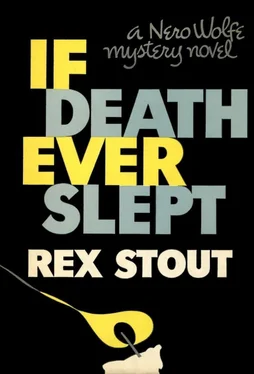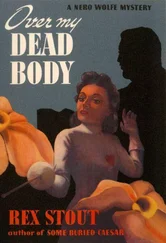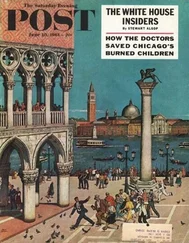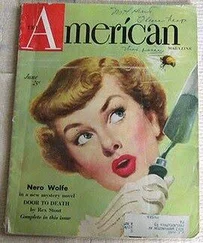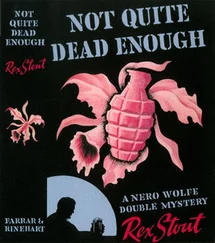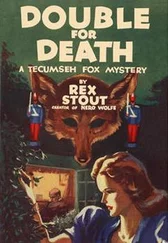With a forefinger he tapped papers on his desk. “Here they are, as typed by Mr. Goodwin. I inspected and analyzed them. It was possible, of course, that the gun had been kept somewhere on the premises where you all live, but I thought it extremely unlikely. At any moment the police, learning of the disappearance of Mr. Jarrell’s gun, might search the place — as they did eventually, one week ago today. It was highly probably that the gun had been kept somewhere else, and I proceeded on that theory.”
“So did I,” Cramer rasped.
Wolfe nodded. “No doubt. But for you it was only one of many lines of inquiry, whereas it was all I had. And not only was it a near-certainty that the gun had been kept in some available spot from Thursday afternoon to Sunday afternoon, but also there was a chance that it had been returned to that spot after Brigham was killed and was still there. On Sunday, when he left the car on Thirty-ninth Street, the murderer had the gun and had to dispose of it somehow. If he put it somewhere, anywhere, where it might be found, there was a risk that it would be found and would be identified both as Mr. Jarrell’s gun and as the gun the bullets had come from. If he put it somewhere where it would not be found — for instance, at the bottom of the river — he might be seen, and besides, time was probably pressing. So it was quite possible that he had returned it, at the first opportunity, if not immediately, to the place where he had kept it for three days. Therefore my quest was for a spot not merely where the gun had been kept for the three days, but where it might still be.”
He took a breath. “So I analyzed the timetables. They offered various suggestion, some promising, some far-fetched. To explore them I needed help, and I called on Mr. Saul Panzer, who is seated there beside Mr. Foote; on Mr. Fred Durkin, on the couch; on Mr. Orville Cather, on the couch beside Mr. Durkin; on Miss Theodolinda Bonner, here at my right; and on Miss Sally Colt, Miss Bonner’s assistant, on the couch beside Mr. Durkin.”
“Get on with it,” Cramer growled.
Wolfe ignored him. “I won’t detail all their explorations, but some deserve brief mention. They were all severely handicapped by the holiday and the long week end. Mr. Goodwin spent four days at the Jamaica and Belmont race tracks. My Panzer traced Mr. Jarrell’s movements on the Thursday when Eber was killed with extraordinary industry and acumen. Mr. Durkin performed with perseverance and ingenuity at the Metropolitan Athletic Club. Mr. Cather found three different people who had seen Mrs. Otis Jarrell in Central Park on the Sunday when Brigham was killed. But it was Miss Bonner and Miss Colt who had both ability and luck. Miss Bonner, produce the gun, please?”
Dol Bonner opened her bag, took out a revolver, said, “It’s loaded,” and put it on Wolfe’s desk. Cramer came breezing around the front of the desk, nearly tripping on Wyman’s foot, spouting as he came, and Purley Stebbins was up too. Dol Bonner told Cramer, “I tried it for prints, Inspector. There were no good ones. Look out, it’s loaded.”
“You loaded it?”
“No. It held two cases and four cartridges when I found it. I fired one cartridge, and that left—”
“You fired it?”
“Mr. Cramer,” Wolfe said sharply. “How could we learn if it was the guilty gun without firing it? Let me finish and you can have all day.”
I opened a drawer of my desk, got a heavy manila envelope, and handed it to Cramer. He picked the gun up by the trigger guard, put it in the envelope, circled Wolfe’s desk to hand the envelop to Purley, said, “Go ahead and finish,” and sat.
Wolfe asked, “What did you do after you found the gun, Miss Bonner?”
“Miss Colt was with me. We phoned you and got instructions and followed them. We went to my office and filed a nick in the barrel of the gun so we could identify it. We then went to my apartment, turned on the radio as loud as it would go, fired a bullet into some cushions, got the bullet, put it in a box with cotton, wrapped the box in paper, and sent it to you by messenger.”
“When did you find the gun?”
“At ten minutes after six yesterday afternoon.”
“Has it been continuously in your possession since then?”
“It has. Every minute. I slept with it under my pillow.”
“Was Miss Colt with you when you found it?”
“Yes.”
“Where did you find it?”
“In a locker on the fourth floor at Clarinda Day’s on Forty-eighth Street.”
Trella Jarrell let out a king-size gasp. Eyes went to her and she covered her mouth with both hands.
Wolfe went on. “Was the locker locked?”
“Yes.”
“Did you break it open?”
“No, I used a key.”
“I won’t ask you how you got the key. You may be asked in court, but this is not a court. Was the locker one of a series?”
“Yes. There are four rows of private lockers on that floor, with twenty lockers to a row. Clarinda Day’s customers put their clothes and belongings in them while they are doing exercises or getting massages. Some of them keep changes of clothes or other articles in them.”
“You said private lockers. Is each locker confined to a single customer?”
“Yes. The customer has the only key, except that I suppose the management has a master key. The key I used — but I’m not to tell that now?”
“It isn’t necessary. You may tell it on the witness stand. As you know, what you did is actionable, but since you discovered a weapon that was used in two murders I doubt if you will suffer any penalty. Instead, you should be rewarded and probably will be. Do you know which of Clarinda Day’s customers the locker belonged to? The one you found the gun in.”
“Yes. Mrs. Wyman Jarrell. Her name was on it. It also had other articles in it, and among them were letters in envelopes addressed to her.”
No gasp from anyone. No anything, until Otis Jarrell muttered, barely loud enough to hear, “The snake, the snake.”
Wolfe’s eyes were at Susan. “Mrs. Jarrell. Do you wish to offer an explanation of how the gun got into your locker?”
Naturally, knowing what was coming, I had been watching her little oval face from a corner of my eye, and she was only four feet from me, and I swear there hadn’t been a flicker. As she met Wolfe’s eyes her lip muscles moved a little as if they were trying to manage a smile, but I had seen them do that before. And when she spoke it was the same voice, low, and shy or coy or wary or demure, depending on your attitude.
“I can’t explain it,” she said, “because I don’t know. But you can’t think I took it that day, that Wednesday, because I told you about that. I was upstairs in my room, and my husband was with me. Weren’t you, Wy?”
She would probably have skipped that if she had turned for a good look at his face before asking it. He was paralyzed, staring at Wolfe with his jaw hanging. He looked incapable of speech, but a kind of idiot mumble came out, “I was taking a shower, a long shower, I always take a long shower.”
You might think, when a man is hit so hard with the realization that his wife is a murderess that he lets something out which will help to sink her, he would at least give it some tone, some quality. That’s a hell of a speech in a crisis like that: “I was taking a shower, a long shower. I always take a long shower.”
As Wolfe would say, pfui.
As it turned out, when Otis Jarrell’s private affairs, at least some of them, became public, it was out of his own mouth on the witness stand. While it is true that evidence of motive is not legally essential in a murder case, it helps a lot, and for that the DA had to have Jarrell. The theory was that Susan had worked on Jim Eber and got information from him, specifically about the claim on the shipping company, and passed it along to Corey Brigham, who had acted on it. After Eber was fired he had learned about Brigham’s clean-up on the deal, suspected he had been fired because Jarrell thought he had given the information to Brigham, remembered he had told Susan about it, suspected her of telling Brigham, and told her, probably just before I entered the studio that day, that he was going to tell Jarrell. To support the theory Jarrell was needed, though they had other items, the strongest one being that they found two hundred thousand dollars in cash in a safe-deposit box Susan had rented about that time, and she couldn’t remember where she had got it.
Читать дальше
